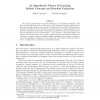1511 search results - page 67 / 303 » On the effectiveness of address-space randomization |
ICTAI
2006
IEEE
14 years 1 months ago
2006
IEEE
The discovery of objects with exceptional behavior is an important challenge from a knowledge discovery standpoint and has attracted much attention recently. In this paper, we pre...
ISMIR
2005
Springer
14 years 1 months ago
2005
Springer
Music information retrieval is characterized by a number of various user information needs. Systems are being developed that allow searchers to find melodies, rhythms, genres, an...
GI
2003
Springer
14 years 1 months ago
2003
Springer
: The Byzantine failure model allows arbitrary behavior of a certain fraction of network nodes in a distributed system. It was introduced to model and analyze the effects of very s...
FOCS
1999
IEEE
14 years 4 days ago
1999
IEEE
We study the phenomenon of cognitive learning from an algorithmic standpoint. How does the brain effectively learn concepts from a small number of examples despite the fact that e...
GECCO
2006
Springer
13 years 11 months ago
2006
Springer
Various methods for ensemble selection and classifier combination have been designed to optimize the results of ensembles of classifiers. Genetic algorithm (GA) which uses the div...

